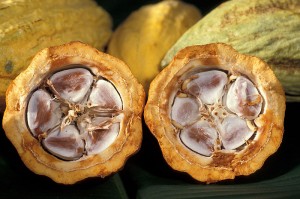A science news story that has been circulating in the media this week is the sequencing of the chocolate genome. I know I’ve already talked about genome sequences and why I think some are more important and interesting than others so I won’t bore you with that. But, I did want to put up links to a couple of different articles on the subject because I think it is interesting to compare and contrast the headlines and leads in terms of who went for the cheesy chocolate jokes, who worked the chocolate in a subtle way, and who went for a strictly hard news angle.
 There is value to all of the approaches, so my mind isn’t made up yet on what I favor. I think if I had to choose I’d go for middle of the road approach (which is usually a pretty safe place to be) and say that you have to work the chocolate in, in some way because its what makes the story fun, but that you don’t have to get ridiculous with yourself and lose the science and the purpose of the story.
There is value to all of the approaches, so my mind isn’t made up yet on what I favor. I think if I had to choose I’d go for middle of the road approach (which is usually a pretty safe place to be) and say that you have to work the chocolate in, in some way because its what makes the story fun, but that you don’t have to get ridiculous with yourself and lose the science and the purpose of the story.
CNN: Sweet scientific discovery in the world of chocolate
ScienceDaily: Sequencing of cacao genome to help chocolate industry, subsistence farmers
GenomeWeb: Consortium Using 454, Illumina Sequencers to Decode Cacao Genome
US News and World Report: A Taste of the Chocolate Genome
SiFy News: Cacao genome sequencing a boon to chocolate lovers
CBS News: Sweet Science Cacao Genome Map Completed
Scientific American: Candy-maker releases cacao (coco) genome sequence online
Reuters: Scientists Unlock Coca Genome, Release to Public Domain
New York Times: Rival Candy Projects Both Parse Cocoa’s DNA
AOL News: Wunderbar! Scientists Crack Chocolate’s DNA Code
Overall, I think that all these articles (which are just a sampling of what is out there) have interesting differences in the way they handle the headlines and even the rest of the body of the story. It might all be about chocolate, but each news organization definitely puts on their own spin.